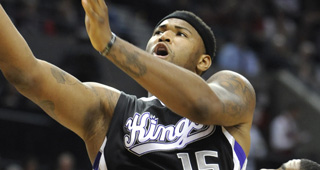On January 13, the Kentucky Wildcats traveled to Knoxville to play the Tennessee Volunteers.
Tennessee, in their first year under coach Cuonzo Martin after the scandal-ridden departure of Bruce Pearl, is an extremely athletic team that has been flying under the national radar. Without Scotty Hopson, a 6’7 McDonald’s All-American, and Tobias Harris, a first-round pick of the Milwaukee Bucks, the Volunteers have been lacking in star power for most of the season.
Kentucky, meanwhile, is once again one of the true Goliaths in college basketball, the third different elite team John Calipari has put together in Lexington in as many years. The Wildcats roll out five-star recruits at all five spots on the floor in much the same way that the New York Yankees play All-Stars at nearly every position on the diamond.
The game was important for both teams: Tennessee desperately needed a signature win to make up for their 7-7 record in non-conference play; one-loss Kentucky was trying to keep pace with two unbeaten teams -- Baylor and Syracuse -- in the race for a No. 1 seed in the NCAA Tournament.
And while Calipari’s squad faced a surprisingly tough test Saturday morning, two of his former stars, Tyreke Evans and DeMarcus Cousins, were playing for far different stakes that night.
The Sacramento Kings game against the Dallas Mavericks was their fourth in five days. It was at the tail end of a road trip that had sent them to the Atlantic seaboard for games at Toronto and Philadelphia before a back-to-back in Texas and another cross-country trip to Minnesota for a game Monday night.
And while the team fired head coach Paul Westphal earlier in the month, the insertion of Keith Smart as the interim coach, like most NBA coaching moves, has been a cosmetic attempt to cover up a cracked foundation.
Sacramento no longer has Samuel Dalembert, their only legitimate interior defensive presence last season. Cousins, a bulky 6’11, 270 center, is the only King averaging more than a block a game, and he does that while playing mostly below the rim, which explains his prodigious rate of 6.4 personal fouls per 36 minutes of action.
Combine that with perimeter defense that ranges from completely inadequate to marginally effective and the Kings have a flashing green light at the front of the rim, giving up 102.2 points per game, 29th in the NBA. Controlling for tempo doesn’t do their defense any favors either, as they give up 108.8 points per 100 possessions, 28th in the league.
The only way Sacramento, who ranks 26th in the league in three-point shooting at 27.6%, can stay competitive is if Evans and Cousins create efficient shots in the paint.
Instead, Cousins spent the majority of his time on the floor attempting to turn himself into a mid-range jump-shooter, negating the two main strengths of his game -- his ability to seal smaller centers in the paint and score with his back to the basket. Evans made no impact whatsoever, playing lethargically while going 1-10 from the floor and scoring three points.
The result was an ugly 99-60 Mavericks victory, with the Kings somehow following up a stunningly inept 33-point first-half with a 27-point second-half.
Dallas, a veteran team trying to survive the condensed regular season, took advantage of Sacramento’s poor effort by playing Dirk Nowitzki only 20 minutes. Afterwards, Mavericks broadcaster Mark Followill called the game “bad for the NBA product” in a radio interview.
For the Kings, a 4-9 team with a -11.5 point differential, the 2011-2012 season is already circling the drain. Saturday’s loss to Dallas is just one more in what’s shaping up to be a long and uncompetitive year. There’s no tangible team goal to dangle in front of them; all that’s left is individual achievement, which is one reason why they’re on pace to average more turnovers than assists this year.
In contrast, the Volunteers will likely look back at their 60-54 loss in mid-January with regret at the end of the season.
Aided by the strong play of the 6’8 250 Jarnell Stokes, a highly-touted high school senior who re-classified as a freshman after graduating in December, they had the No. 2 ranked team in the nation on their heels through most of the first half but couldn’t build a big enough lead to withstand the inevitable Wildcat charge. With dozens of NBA scouts in the building, Anthony Davis and Michael Kidd-Gilchrist, the two brightest stars of Kentucky’s freshman class, made game-changing plays on both sides of the ball to close out Tennessee with a 11-6 run.
The play of Stokes, a likely first round pick, is clearly a reason for optimism with the majority of SEC play ahead of them, but a win over Kentucky would have validated their entire season. Not only would it have significantly improved their chances of making the Tourney, it would have had a powerful affect on their national profile, showing that Tennessee can attract the type of athletes that can run without fear and survive against the Calipari juggernaut.
That’s why Indiana’s 72-70 win over Kentucky in December was such a big deal in Bloomington. Tom Crean’s team was able to go toe-to-toe with Calipari’s, signaling the return of one of the sport’s true blue-brood programs to the national stage for the first time after a decade of mediocrity.
Look at the delirious way the Hoosiers fans rushed the court at Assembly Hall after Christian Watford’s buzzer-beating three-pointer. Now try to imagine a scenario where anything that happens in the NBA’s regular season could possibly generate a similar level of emotion.
The playoffs overshadow the regular season in every sport, but the NBA does a particularly poor job of capturing fan interest in the long months before May and June.

Jonathan Tjarks wrote on the NBA for RealGM from 2011-2016 before joining The Ringer.
Follow @JonathanTjarks on Twitter.


